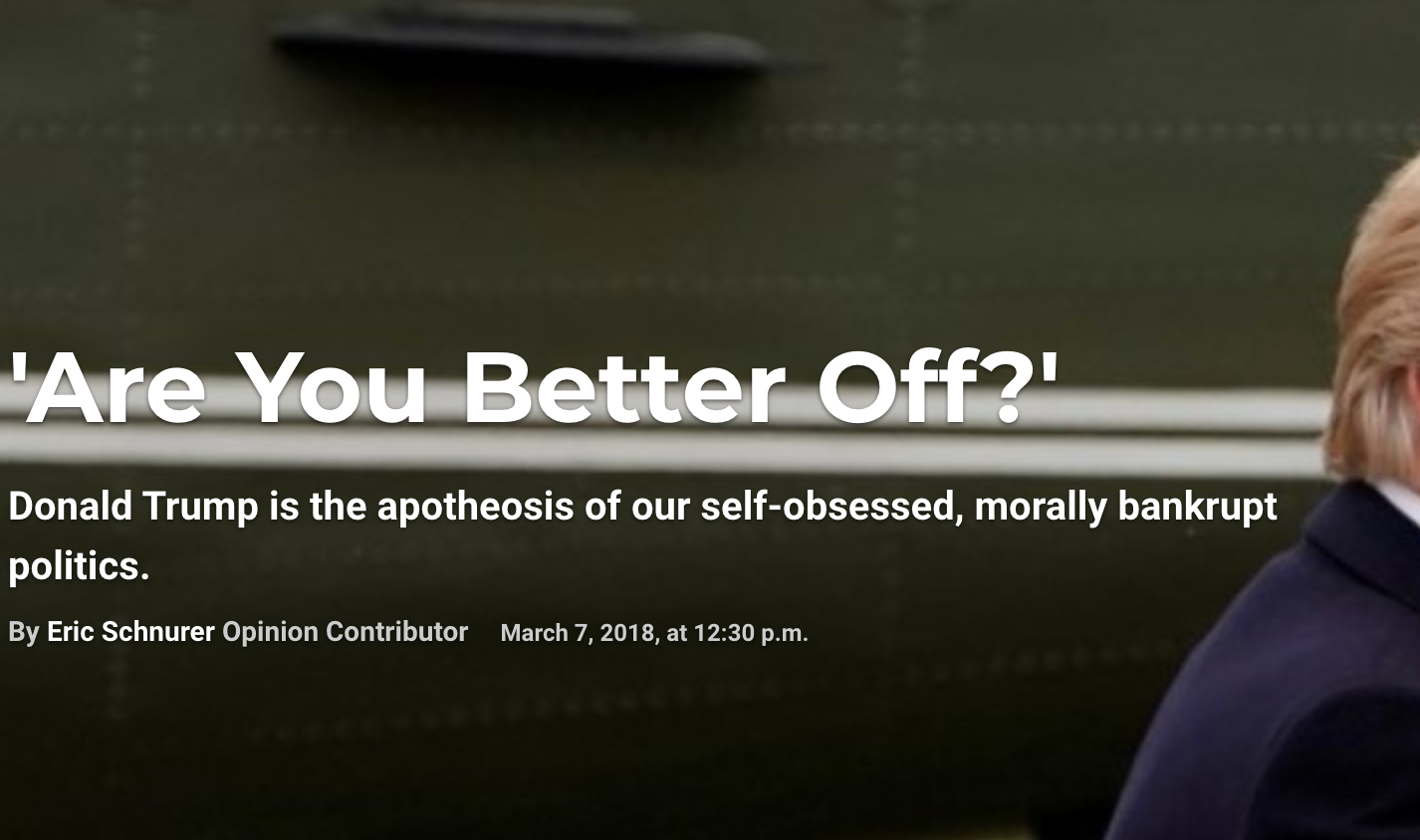“Are You Better Off?”
March 13, 2018 By Eric Schnurer No comments yet 2016 Presidential Election, Democratic Party, Democrats, Donald Trump, Government, Parkland shooting, President Barack Obama, Republican Party, Republicans, Trumpism
 I just wanted to share with you my most recent piece for US News & World Report, which is also, sadly, my last, as they’ve discontinued their Opinion section. Watch for news on my new writing outlets soon.
I just wanted to share with you my most recent piece for US News & World Report, which is also, sadly, my last, as they’ve discontinued their Opinion section. Watch for news on my new writing outlets soon.
PRESIDENT DONALD TRUMP last week launched an international trade war, hung up on Mexico’s president because he wouldn’t agree to pay for Trump’s border wall and announced he favored seizing guns without due process (a position from which he quickly retreated). These issues all have something in common (other than Trump) that goes to the root of what’s wrong in American politics today.
As discussed (here and here) during the 2016 campaign, both trade and immigration constitute a particular type of problem: Each benefits the larger society, raising the standard of living not just of the country as a whole but also of the majority within it. Yet both produce losers; various studies show, for instance, that immigration results in higher earnings for those with already-higher earnings – but lower wages for the lower-skilled.
Such “wedge issues” are used by politicians to drive Americans apart to the advantage of no one but these politicians. They are a means to exploit people’s misfortune by turning it into anger – and then turning that anger into votes. What they are not are exercises in building constructive solutions to problems, through compromise, consensus or common cause. And they are all traceable to the single watershed moment in which Ronald Reagan transformed American politics into the unrelenting exercise in selfishness that it is still today, when he asked Americans to vote on the basis of one question alone: Are you – not the country as a whole, or others, but you – better off today than you were four years ago?

Yes, politics is largely about self-interest, and even the Framers believed that a balance of self-interests, not messianic utopianism, was the central requirement of stable democracy. But the country’s leaders used to call us to a vision – even when the ultimate goal was individual freedom and self-realization – of an America greater than each of us individually. “Ask not what your country can do for you, ask what you can do for your country” died with “Are you better off?”
Trump is the apotheosis of this morally-denuded politics. Has there ever been a human being so clearly interested in nothing but himself? Despite his faux populism, his agenda in office has been a mix of standard-issue tax breaks targeted almost entirely to his fellow plutocrats and banana-republic self-enrichment. Even his conception of “making America great again” is about atomized self-interests, not any notion of an “America” embracing all, or even most, of us, knit together to form a society: A “greater good” beyond individual grievance? Global leadership? Moral values? As Robert D. Kaplan recent wrote in The National Interest (by no means a liberal publication), “[Trump] has also, with his calls for protectionism and a narrowly defined American self-interest, voided American foreign policy of any real, uplifting purpose – another sure sign of decline.” We are, in short, a country losing its way morally, one wallowing wholly in self-interest.
Whatever Trumpism’s underlying themes of racial, sexual and economic resentments, Trump has chosen trade, immigration and the demise of extractive industries as his chisels to break apart American society precisely because, while these have generated tremendous gains for the U.S. as a whole, they produce a subset who pay the price for the overall advance. Morality – as well as a practical regard for political reality and social peace – suggests that some of the gains of progress be redistributed to its victims; this might, in fact, be regarded as the core of “progressivism.” But as Democrats have become the “Party of the Ascendant,” those left behind by the world economy – largely older, white, religious, conservative males with lower levels of education living in rural or exurban areas – don’t seem all that appealing, or deserving of solicitousness, to “progressives” nowadays. In lieu of adequate solutions, Trumpism has been left to exploit the resulting unfairness and resentment to tear down both broader progress and all social cohesion.
This is exemplified in the current polarization over guns, as well, a point brought home by a Douglas High School student, Emma Gonzalez. Toward the end of her fiery speech with its refrain, “We call B.S.,” Gonzalez observed that the position of gun advocates appears to be that their rights to own guns outweigh children’s right to live. This has been a recurrent liberal argument since the Parkland shootings – but liberals ought to be wary of assertions that all rights must be balanced against other concerns: The rights to a fair trial, or against cruel and unusual punishment, or to free speech simply are not outweighed by governmental exigency or others’ sensitivities. Nonetheless, as I wrote after these shootings, most of us recognize and voluntarily concede non-governmental restraints on our rights in order to live in, and help produce, a functioning society with others. It’s called decency.
What’s striking about the gun debate today is the absolute unwillingness to seek the kinds of compromise necessary to a society, as opposed to an unwilling collection of individuals. We are no longer interested in anyone else’s perspective or anyone else’s rights. As Gonzalez summed up the situation, dismissively, “Mine! Mine! Mine! Mine!”
This phenomenon isn’t helped by Trump’s suddenly announcing that, as on so many other issues, the answer is to empower his own id and worry about constitutional rights later, if at all. We actually don’t need a Great Leader who believes that He Alone can solve our problems as a society – although that is an appealing solution to a growing, and scary, number of Americans. Rather, we need a society willing to solve its problems as a society.
It’s increasingly clear that we no longer live in such a world. We increasingly live, rather, in neighborhoods where no one disagrees, read news that doesn’t challenge our views, select our own definition of truth like we do our own music, and never have to adjust our preferences to those of anyone else. Neither politics, governments nor countries as we know them will last in such an environment. The question is whether such concepts as common good, or compromise, will.
Recent Posts
On Twitter
Follow Public Works and Eric Schnurer on Facebook
Email Newsletter
Don't miss another post. Get the latest news and analysis of current events and public policy from Eric Schnurer.
EricSchnurer.com
Archives
- December 2018
- October 2018
- September 2018
- June 2018
- May 2018
- March 2018
- February 2018
- January 2018
- December 2017
- October 2017
- September 2017
- July 2017
- June 2017
- May 2017
- March 2017
- February 2017
- January 2017
- December 2016
- November 2016
- October 2016
- September 2016
- August 2016
- July 2016
- June 2016
- May 2016
- April 2016
- March 2016
- February 2016
- January 2016
- December 2015
- November 2015
- June 2015
- May 2015
- April 2015
- March 2015
- February 2015
- January 2015
- December 2014
- November 2014
- October 2014
Contact Info
610-296-9443
eschnurer@public-works.org







Leave A Comment